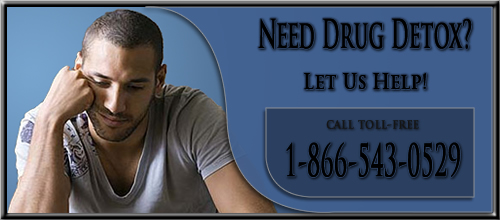Drug Detox
- Heroin Detox
- Cocaine Detox
- OxyContin Detox
- Marijuana Detox
- Crack Detox
- Meth Detox
- Xanax Detox
- Ambien Detox
- Vicodin Detox
- Percocet Detox
- Lortab Detox
- Hydrocodone Detox
- Opiate Detox
- Ativan Detox
- Methadone Detox
- Demerol Detox
- Medical Detox
- Drug Free Detox
- Rapid Detox
- Drug Substitution Detox
- Drug Weaning Detox

Opiate Detox
Often, ending one's opiate addiction requires entering an Opiate detox program. Opiates such as heroin, Vicodin and OxyContin are among the most highly addictive substances in the world. As such, breaking the cycle of opiate addiction requires serious professional help and a comprehensive approach to treatment that addresses every aspect of the dependence; both physical and psychological.
Today, many Americans have become dependent upon their prescription opiate medication. And, in most cases, it was a part of a natural process of coping with pain or a psychological concern. In a recent study, 16.2 million Americans age 12 and older had taken a prescription pain reliever, tranquilizer, stimulant, or sedative for non-medical purposes at least once, in the year prior to being surveyed.
Opioids are commonly prescribed because of their effective analgesic, or pain-relieving, properties. Studies have shown that properly managed medical use of opioid analgesic compounds (taken exactly as prescribed) is safe, can manage pain effectively, and rarely causes addiction. However, patients who are prescribed opioids for a period of time may develop a physical dependence on them. Repeated exposure to opioids causes the body to adapt, sometimes resulting in tolerance i.e. more of the drug is needed to achieve the desired effect compared to when it was first prescribed.
As mentioned above, opiates are both physically and psychologically addicting. The physical component of opiate addiction recovery is addressed through opiate detox. Detoxification is an essential part of the recovery process because it cleanses the individual of the harmful elements that have built up in their body over the course of their addiction. It is also important to note that the opiate detox process does not represent a full recovery from addiction – only the physical aspect. In order to achieve full recovery, an individual must also address the psychological dependence to the drug in question, which is achieved through counseling and aftercare.
Who needs opiate detox?
Attending an Opiate detox program can help those suffering with:
- Buprenorphine (Subutex/Suboxone) Addiction
- Heroin addiction
- Methadone addiction
- Opium addiction
- OxyContin addiction
- Vicodin addiction (or Hydrocodone addiction)
What can I expect during opiate detox?
These programs are held at the drug rehab facility itself, or offsite in a hospital setting or at a stand-alone detox center. In most natural opiate detox programs, the individual will stop taking the drug in question while in the care of a professional. The professional is there to make sure that the individual stays healthy in mind and body during the process, which is likely to include uncomfortable and temporarily debilitating withdrawal symptoms.
An individual going through opiate detox is likely to experience several days worth of withdrawal symptoms. These symptoms are generally non-life threatening but they can cause a great deal of discomfort and have led more than one individual to relapse into drug use.
The most common opiate detox withdrawal symptoms are:
- Depression
- Anxiety
- Mood swings
- Fever and chills
- Goosebumps
- Sleeplessness and insomnia
- Restlessness
- Strong drug cravings
- Nausea, diarrhea and vomiting
These symptoms usually make their first appearance approximately 48 hours after the last dose of the opiate has been taken. They usually last for a period of 3-4 days but can go on longer based on the individual and the depth of his or her addiction.
